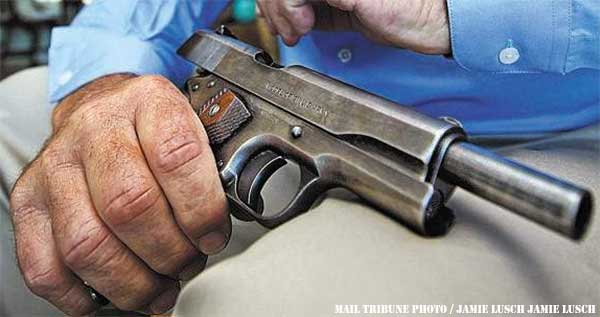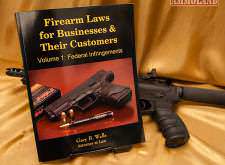By Gary B. Wells


USA – -(Ammoland.com)- Over the last few years firearm businesses and owners have been inundated by unconstitutional state laws blatantly infringing on the Second Amendment.
The Republican-controlled legislature has prevented such lunacy at the federal level, providing the excuse for the executive branch to pursue its own unconstitutional measures, but in a different direction.
Recognizing that the unlikelihood of achieving its goal of an outright firearms ban for now, successful federal efforts have been directed not to prohibiting firearms, but to banning those who can possess them.
The ultimate goal is the same, ensuring that no citizen is legally qualified to own a firearm.
The original Gun Control Act of 1968 provided firearm and ammunition restrictions based on four categories of individuals: 1) persons convicted of a crime “punishable by imprisonment for a term exceeding one year,” 2) fugitives from justice, 3) drug users or addicts, and 4) persons “adjudicated as a mental defective” or who have “been committed to a mental institution.” Three restrictions applied to persons qualifying under these categories: 1) precluding federal firearms licensees (FFL’s) from selling firearms or ammunition to them, 2) preventing shipping companies from transporting or delivering firearms or ammunition to them, 3) and preventing prohibited persons from shipping or transporting firearms or ammunition in interstate commerce.
Significantly, there were no prohibitions on possession. If a prohibited person was in possession of a firearm or ammunition prior to the 1968 law, they could continue to posses that firearm. Similarly, if a person possessed a firearm or ammunition prior to qualifying as a prohibited person, they did not lose their right to continue that possession.
The three restrictions dealing with prohibited persons were greatly expanded in 1986. First, the selling or “disposal” of firearms and ammunition to a prohibited person is no longer limited to FFL’s, but to all persons. Second, the prohibition on shipping companies was expanded to all person to preclude anyone from shipping or transporting to a prohibited person. Finally and most restrictively, the law now precludes the possession of firearms or ammunition by prohibited persons.

The scope of persons qualifying as a prohibited person has also increased. The original four categories have expanded to nine, now including illegal aliens and those admitted into the country under nonimmigrant visas, persons dishonorably discharged from the military, persons who have renounced their United States citizenship, persons subjected to court-ordered domestic restraining orders, and persons with misdemeanor convictions for domestic violence. As Supreme Court Justice Clarence Thomas observed during oral arguments in Voisine v. United States, no other constitutional right is permanently suspended based on a misdemeanor violation of state law, particularly where the violation may be based on merely reckless conduct. Accordingly, the states can easily expand those prohibited from obtaining firearms through the use of expanded felony laws, restraining orders, and misdemeanor convictions.
A domestic violence restraining order may be issued with little more than a loud argument and a misdemeanor conviction for domestic violence may be for nothing more than an “offensive” touching, including pushing the other person’s hand out of the way before they can remove documents from your briefcase or purse. The person does not have to be injured.
In California, the person may not even need to be touched so long as something attached to or closely connected with the person is touched. With the expansion of the definition of a domestic partner and almost half of marriages leading to divorce, this is an area ripe for the permanent loss of firearm rights.
In addition, the scope of those qualifying under the original prohibited persons list has been greatly expanded, beginning with those with felony convictions. The expansion of laws qualifying as felonies from those existing at the time of our founding fathers or even in 1968 is staggering and creates substantial doubt on the appropriateness of the use of felonies as a disqualification for firearm and ammunition prohibitions.
Laws include hundreds of felonies that would preclude a person from possessing firearms or ammunition, including:
- Releasing helium-filled balloons under the Florida Air and Water Pollution Control Act;
- Making a false statement, not under oath or in writing, to a government official;
- Getting lost and accidentally crossing over into a federally-protected wilderness area while snowmobiling;
- Or providing information about the design or construction of a firearm on the Internet.
The disqualification for felonies has become an onerous and inappropriate infringement for what should be limited to violent felonies.
While limiting the felony prohibition to only “violent” felonies should not be controversial, another level of discussion should be considered. If a convicted felon remains a sufficient risk that he should not be allowed to possess a firearm, then why is he allowed to roam free until more victims suffer at his hands? Despite the laws, convicted felons obtain firearms easier and more quickly than law-abiding citizens, often within a day after being released from prison. Moreover, firearms are obviously not the only weapon of choice. Releasing violent felons after minimal sentences only leads to more victims. If they are too dangerous to be allowed to possess a firearm, they should not be on the street. If they are not dangerous, they should not be precluded from protecting themselves and their families with a firearm. This topic of discussion is fraught with many complicated issues, including determining who is dangerous and who is not, but it should be a matter of thoughtful legislative and judicial consideration.
The more recent area of expansion of prohibited persons deals with those receiving benefits from military service or social security.
Hoplophobics in the executive branch have decided that a sweeping method for gun confiscation and prohibition is achieved by simply finding that any person relying on a third person to handle their finances is a “mental defect.” The regulations (not the statutes) define a person as mentally defective if that person “lacks the mental capacity to contract or manage his own affairs.” Thus, the Department of Veterans Affairs decided that a person (veteran or dependant) should be reported to the background check system and precluded from obtaining (and effectively possessing) firearms or ammunition solely on the ground that a fiduciary was needed for the person to handle their VA benefits. It did not matter if the reason for the fiduciary was for convenience rather than necessity. The VA does not conduct a hearing unless specifically requested and those hearings are limited to determining the ability of the person to manage their finances. They do not address the issues of dangerousness, propensity for violence, or competence and ability to function in any other area. Yet, by making decisions regarding ability to manage finances, the VA affects the ability of veterans to possess firearms and ammunition.
Similar to the minor conduct that may qualify as a felony, the use of a fiduciary to handle finances in these cases is largely irrelevant to firearm ownership. The objective is not based on risk, but on creating another basis for sweeping gun prohibitions. The Department of Veterans Affairs has reported approximately 177,000 veterans to the NICS without any formal proceedings. While only a small fraction have appealed, approximately twenty percent of those who have appealed have prevailed in restoring their firearm rights. Approximately 4.2 million social security beneficiaries receive payments through a representative payee. The Social Security Agencies’ plan to review the files of approximately 75,000 people each year.

Firearms businesses and owners can expect further federal actions to disqualify them from possessing firearms and ammunition as an option to restricting firearms. Any speculation as to what the next restrictions may by only provides ammunition to those who wish to take our ammunition away, so I will refrain from doing so.
[Note: The above analysis provides only a very general description of the laws and ignores many detailed qualifications and nuances. It is designed to be informative, but cannot be relied on as legal advice.]
Gary B. Wells is licensed to practice law in the states of California and Texas. He provides a range of legal services for firearm businesses and owners. His recent book, “Firearm Laws for Businesses & Their Customers, Volume 1: Federal Infringements” can be purchased at www.firearmslaw.attorney.
Contact Information:
Gary B. Wells, Attorney at Law
6083 N. Figarden Dr., PMB #203
Fresno, CA 93722
(559)275-2429
gary@firearmslaw.attorney
